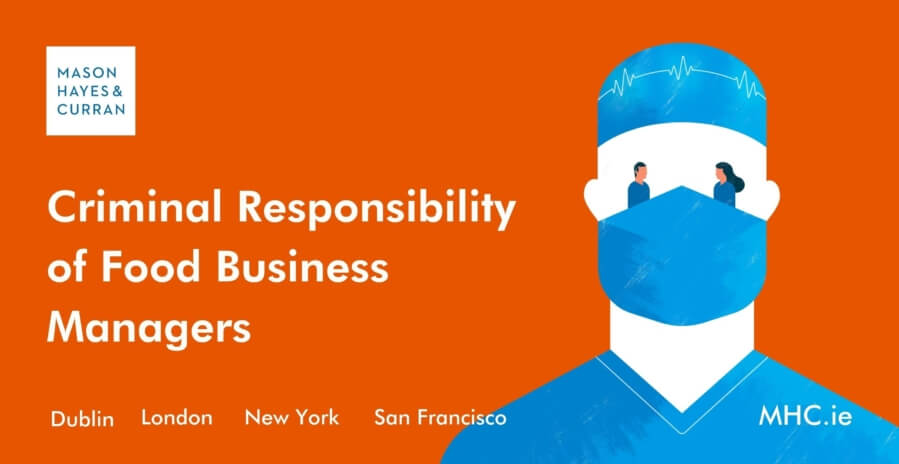Criminal Responsibility of Food Business Managers

Kildare Meat Factory Prosecution
Kildare Chilling Company was fined €400,000 in respect of a workplace death of an employee on 21 January 2022 at Naas Circuit Court. Alexandru Coceban died after he was struck by a forklift at the company’s meat factory.
Judge Mary O’Malley Costello said Mr Coceban’s death was “a most dreadful incident” which resulted from the company’s failure to provide a safe route for pedestrians on the factory floor of the Kildare plant. Judge O’Malley Costello remarked that it was hard to see how the dangers were missed as there was an obligation on the company to ensure the safety of its staff in the workplace.
Judge O’Malley Costello accepted evidence that workers at the factory were careful and that the company had a good safety record and engaged fully with the Health and Safety Authority as well as not disregarding workplace risk on purpose. She also acknowledged the remorse shown by the company’s directors and their reaction to the death of Mr Coceban.
The court heard that the company engaged in regular health and safety training for staff. The company carried out instruction in different languages and had made significant efforts to remedy its failings to ensure such a fatality does not happen again.
The Judge also praised the family-run firm for its support for Mr Coceban’s family including the funding of the repatriation of his body to Moldova and its “correct and proportionate” response in dealing with legal claims.
No prosecution was brought against any individual mangers, directors, or officers.
Prosecution of Dairy Processing Business and Manager
Referring to a separate case, the Irish Farmers Journal reported that on 4 November 2021 at Ballinasloe District Court, Arrabawn Co-operative Society Limited (Arrabawn) was convicted and fined €40,000 for breaching food law. Arrabawn was ordered to discharge the Food Safety of Ireland’s legal costs and a contribution to the investigation costs.
A former quality manager for the company was also convicted and fined €6,500.
The investigation found that documents had been illegally forged or altered and that these records were then provided to business customers, third-party auditors and to authorised officers.
The breaches of food law in this case included:
- Two charges of possession of forged or altered documents relating to testing of pasteurised milk.
- Possession of forged documents relating to testing and calibration records.
- Possession of forged documents relating to packaging integrity and water treatment.
- Failing to ensure that food handlers were adequately supervised and instructed and/or trained in food hygiene matters.
- Two charges of failing to comply with microbiological criteria for Enterobacteriaceae in pasteurised milk, and
- Supplying inaccurate information concerning the folic acid content of milk.
The Court noted in mitigation that senior management at Arrabawn acted immediately in large-scale investment and improved governance arrangements when discovering the breach.
Conclusion
These two cases indicate that prosecuting authorities, and the Courts, will always be cognisant of the Supreme Court decision in DPP v TN in deciding whether individual managers should be held to account for crimes committed by food businesses.
Accordingly, the person’s real-world function and role is decisive, not their nominal job title. The person must, however, have real authority and responsibility over the area in question to be considered potentially criminally liable. A manager for this purpose is not confined to someone in a top-level position. Adequate compliance training to all such managers liable to prosecution should be considered by food businesses.
For detailed advice on regulatory criminal investigations and prosecutions please contact a member of our Health & Prosecutions team.
The content of this article is provided for information purposes only and does not constitute legal or other advice.
Share this:




